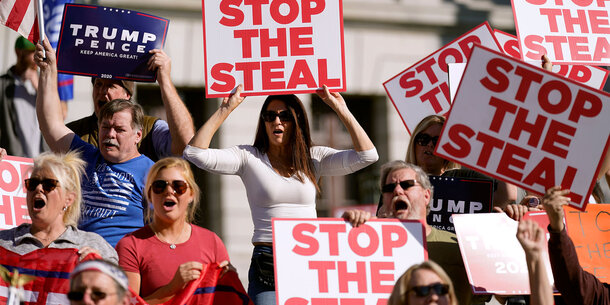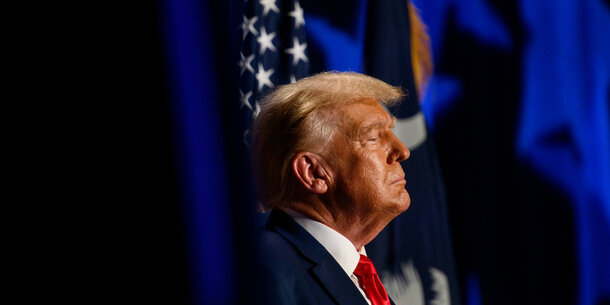By now, word is out about the election-detonating dangers posed by the so-called “independent state legislature theory.” So in recent months, the theory’s proponents have tried to persuade the Supreme Court and the broader public that there are more moderate, less problematic variants of the theory out there. But there’s no “lite version” of the independent state legislature theory. The gerrymanderers who put the theory on the Supreme Court’s doorstep in Moore v. Harper are asking for a radical upending of election law and all the chaos that comes with it, no matter how they try to soft-pedal it.
Moore, which is up for oral argument on Wednesday, has the potential to turn American elections upside down. The North Carolina legislators who brought the case to the Court want to restore their extreme gerrymander of their state’s congressional map. To do so, they’re asking the Court to mainstream a fringe, ahistorical reading of the U.S. Constitution that would grant them and other state legislators near-exclusive authority over federal elections by eliminating the system of checks and balances that has governed for over two centuries. If the legislators get their way, governors, state courts, state constitutions, and even the people themselves could lose their say in shaping the laws for federal races.
The consequences, as we and others have described in extreme detail many times before, would be devastating. The theory wouldn’t just kneecap the nationwide movement against partisan gerrymandering. It could also eliminate — for federal elections — state constitutional provisions that protect your right to vote, such as those that ensure your right to cast an absentee ballot, establish automatic voter registration, and even guarantee fair elections or equal protection of the law. In all, the theory could upset more than 170 constitutional provisions, more than 650 state statutes, and thousands of policies that make elections run smoothly.
No one would want to own these consequences, not even the theory’s proponents. So they started retreating from the theory as soon as they raised it, using their briefs to offer the Court a series of purported compromise positions that would (ostensibly) lead to fewer disruptions of existing elections practices and rules.
But the legislators’ approach is as mealy-mouthed as it is incoherent. They propose their compromises and ask for the most extreme version of their theory in virtually the same breath, never truly backing away from it. And, at a logical level, the compromises inevitably lead to the most extreme outcome. That’s because the theory rests on the radical proposition that state legislatures and state legislatures alone get to make the rules for federal elections (save for potential interventions from Congress or the federal courts). So, even if the gerrymanderers tell the Court that governors’ vetoes or independent redistricting commissions would be spared, the theory’s logic would inevitably eliminate them.
But, a justice sympathetic to the theory might propose, perhaps the theory could be cabined in those ways. Wouldn’t that be all right?
Let’s dispel that notion quickly. Any version of the theory would have devastating and intolerable consequences. Indeed, the two most prominent limiting principles that the independent state legislature theory’s supporters propose are not only inconsistent with their theory but would also not limit the damage much at all.
First, the gerrymanderers have suggested that certain “procedural” state constitutional provisions could still constrain state legislatures when they regulate federal elections, so long as the provisions only regulate how laws are made, not what the laws say. This “version” would likely preserve governors’ power to veto legislation and voters’ power to reject legislation via referenda. It might also salvage independent redistricting commissions. But it would doom crucial voting protections for federal elections.
For example, this version would eliminate state courts’ power to enforce anti-gerrymandering provisions for congressional map drawing. The high courts in Florida, Maryland, New York, North Carolina, Ohio, and Pennsylvania have all relied on these provisions to strike down gerrymanders enacted by both parties. It would also prevent state courts from enforcing substantive constitutional rights, like protections on the right to vote that are enshrined in the constitutions of nearly every state. Constitutional provisions that make it easier to vote could be eliminated, such as those establishing automatic voter registration in Michigan and Nevada or those guaranteeing absentee or mail voting in 16 states. As would constitutional provisions that establish ranked-choice voting in Alaska and Maine and voting machine testing procedures in Montana and Ohio.
Second, some supporters of the theory — and Justice Samuel Alito — have proposed that state courts could enforce “specific” constitutional provisions, just not “general” or “open-ended” ones, when judging federal election disputes. Under this rule, key state constitutional guardrails that safeguard the right to vote could fall, with provisions that protect free speech, fair elections, and equal protection all declared too vague for state courts to enforce. That alone is an astounding and radical proposition. There’s more, though: Most state court judicial review would be eliminated. And state court decisions in every state in the country could be nullified.
The principle could also limit governors’ and election officials’ contributions to election rulemaking for federal elections, wiping out thousands of administrative policies that govern the nuts and bolts. This would affect everything from voter registration, polling place locations, and vote-counting processes to voting machine procurement, audit procedures, and election security protocols.
Each of these approaches would be impossible to administer and would introduce mass confusion into our election system because they rely on unintelligible distinctions between “substance” and “procedure,” “open-ended” and “specific” legal provisions, and so on. That promises an explosion of federal lawsuits as litigants desperate to get a win throw everything at the wall to see what sticks. What’s more, each requires state election administrators to use two different sets of rules when administering state and federal elections, which happen simultaneously, creating even greater confusion and room for error.
In sum, the independent state legislature theory, in any form, poses an extraordinary threat to American elections. The only way to avoid this chaos is for the Court to reject the theory, in all its purported forms.




